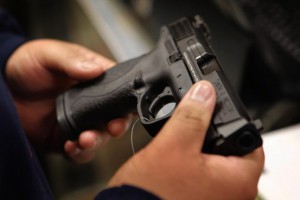Mental Health Patients Can Own Guns, Court Rules
It sounds like a crazy idea, but the Sixth Circuit has ruled that people committed to mental institutions may own a gun. Gun control proponents might believe the ruling is insane, but the decision is not as loony as it sounds.
 Insanity puns aside, the hero of our story is 73 year old Clifford Charles Tyler, a Michigan resident. In 2011, Tyler attempted to purchase a gun. He was denied after an FBI background check showed that he had been held at Ypsilanti Regional Center in 1985 for depression and suicide watch. Tyler was involuntary held at the Center for a month after his ex-wife of 23 years took all their money and left Tyler for another man.
Insanity puns aside, the hero of our story is 73 year old Clifford Charles Tyler, a Michigan resident. In 2011, Tyler attempted to purchase a gun. He was denied after an FBI background check showed that he had been held at Ypsilanti Regional Center in 1985 for depression and suicide watch. Tyler was involuntary held at the Center for a month after his ex-wife of 23 years took all their money and left Tyler for another man.
However, Tyler left the Center completely healthy. He remarried in 1999, maintains good relations with his daughters from his first marriage, and has no criminal history before or after his stay at the Center. In fact, Tyler voluntarily underwent another psychological evaluation in 2012. According to the most recent evaluation, Tyler has not had another depressive episode since his divorce in 1985 and the psychologist reported that she could not find any evidence of mental illness in Tyler.
Why So Serious?
For those uninterested in the administrative jargon, Tyler was denied a firearms license because he was a former mental patient. Federal law gives Tyler the right to expunge that ban, but Congress had defunded the ability to make that appeal and Michigan declined to make such an appeals process itself. So where did that leave Tyler?
Tyler’s attorneys brought a lawsuit and the Sixth Circuit made their groundbreaking decision. The Appeals Court agreed that the government can prevent the mentally ill from obtaining a gun because of the risk of public injury. However, just because an individual was committed to a mental institution does not mean they are mentally ill. There might be overlap, but the fact that federal law prohibits both the mentally ill and people committed to mental institutions from possessing firearms means that Congress itself knew there was a distinction when they wrote the law. Although mentally ill people are outside the scope of the Second Amendment because of public safety concerns, the Court could not find a reason that a former patient like Tyler should be prohibited from being able to exercise his constitutional right.
Justice Is Ironic
The Court probably could have decided this case based on Due Process rather than the Second Amendment, but I think this decision reached the proper outcome. Most pundits would probably focus on what this case means for the NRA or for gun owners, but this is an unexpected victory for another group of people: mental health patients.
The Appeals Court didn’t get into why people committed to mental institutions were denied gun ownership. It’s obvious why mentally ill people are denied firearms, but what about regular people who just need mental health assistance? There has long been stereotyping and misunderstanding about people who see psychologists or seek mental health. People who are depressed or who are abusing substances are expected to deal with it, but are often discouraged from seeing experts about it. There is growing recognition that it’s OKAY to seek help for mental health issues. Obamacare requires that insurance companies include mental health services in their insurance coverage, but it’s not enough.
Prohibiting people committed to mental institutions from possessing a gun only made such stereotypes worse. Those stereotypes have prevented people from seeking out professional help before their mental health programs caused greater harm. If we can encourage people to seek professional health before their condition progresses too far, we can stop mass shootings while expanding our right to bear arms.


Comments
I’m a little confused, they will allow a person that has had some past mental issues, to own a gun. Okay that is to say that just because the man has been to a mental health institution doesn’t mean he is mentally ill, so he should be allowed to own a gun. Well just because a person has been to prison, doesn’t mean he is crazy either, or that he should loose his constitutional right to own and bear arms as well. This is the great hypocrisy of America. A person who has been to a mental health facility is more of a risk that an ex felon, who has not used an actual physical hand gun to commit a crime, and is not a violent criminal has the right to own and bear arms like any other free man. I mean lets be real, most of the mass shooting incidents have all been from people with mental problems. Criminal are usually killing criminals, and they will always have access to weapons. so ex-felons should be allowed to own a fire arm to defend protect their families and property like any other American. So long as they do not owe the state anymore obligations.